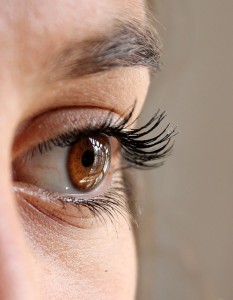
More people around the world than ever use contact lenses, but while their advantages are well known to many, the health risks of contacts are often overlooked. Most crucially, the unhealthy hygiene habits of contact lens wearers often put them at the greatest risk.
According to a recent study in Morbidity and Mortality Week Report by the Centers for Disease Control and Prevention (CDC), a vast portion of contact lens wearers admitted to engaging in at least one hygiene habit that could lead to eye infection. With an approximate 40.9 million adults living in the United States wearing contact lenses and Contact Lens Health Week running from August 24 – 28, the ophthalmologists at the USC Roski Eye Institute want as many people as possible to know what dangerous contact lens behaviors can lead to serious eye infections.
Healthy contacts mean healthy eyes
The following are the most common unsafe hygiene habits concerning contact lens use and what percentage of users admitting to performing them previously. Stay aware of how these actions can endanger your eyes and consider your everyday choices when it comes to contact lens use.
- Overnight Sleeping While Wearing Contact Lenses: 50.2%
- Taking a Nap While Wearing Contact Lenses: 87.1%
- Adding New Lens Solution to Existing Solution Instead of Completely Replacing (Known as Topping Off): 55.1%
- Waiting Longer Than Recommended to Replace Contact Lenses: 49.9%
- Waiting Longer Than Recommended to Replace Contact Lens Case: 82.3%
- Forgoing Use of a Contact Lens Case: 8.9%
- Using Tap Water to Store Contact Lenses: 16.8%
- Using Tap Water to Rinse Contact Lenses: 35.5%
- Taking a Shower While Wearing Contact Lenses: 84.9%
- Swimming While Wearing Contact Lenses: 61.0%
- Never or Rarely Washing Hands Before Inserting Contact Lenses: 3.7%
- Never or Rarely Washing Hands Before Removing Contact Lenses: 13.3%
While the use of disposable contact lenses has helped many people avoid a large portion of these risks, there are still many unclean behaviors that affect all types of contact lens wearers. Specifically, these actions lead to microbial keratitis, which can progress rapidly and destroy the cornea, leading to loss of vision.
Taking care of your contacts
Should you wear contact lenses even on rare occasions, there are multiple precautions that you should always follow. By doing so, you can greatly decrease your risk of a serious eye disease linked to contact lens use.
- Thoroughly wash hands with soap and water prior to touching contact lenses.
- Remove your contacts before swimming, sleeping, or showering.
- Use disinfecting solution on contacts every time they are removed.
- Clean contact lens cases with solution, dry with a clean tissue, and store upside down with the caps off after every use.
- Replace your contact lens case every three months.
- Completely discard old contact solution and replace with fresh solution when done.
- Take a backup pair of glasses with you should your contacts need to be removed.
By combining proper contact lens care with the help of a skilled ophthalmologist, you can have the best chances of keeping your eyes healthy and catching any infections before they cause severe eye damage and sight loss. Both during Contact Lens Health Week and throughout the year, your awareness can save your vision and the sight of your loved ones.
Expert vision care at the USC Roski Eye Institute
To make an appointment at the USC Roski Eye Institute, please call (323) 442-6335 or contact us to schedule a consultation today.
Topics
